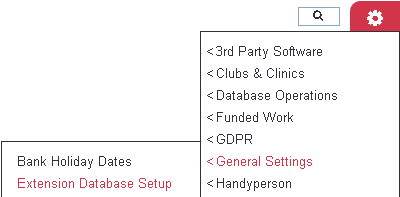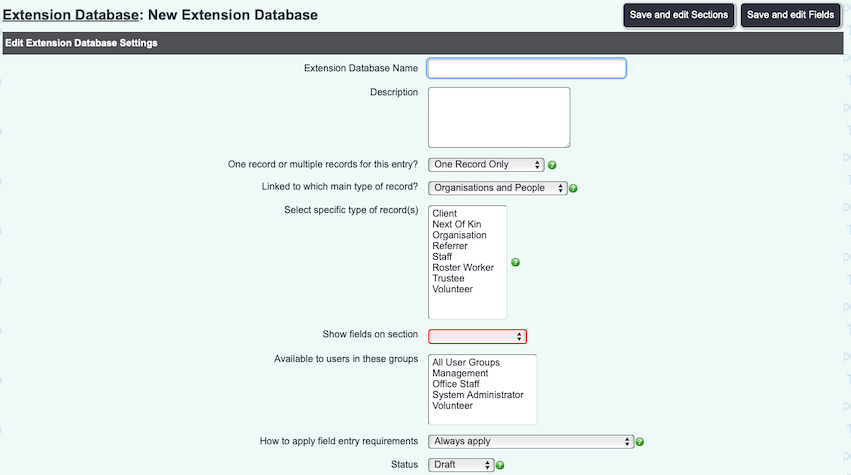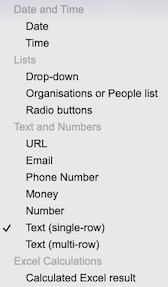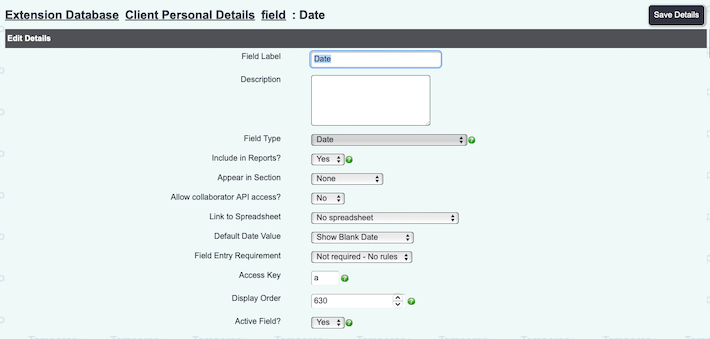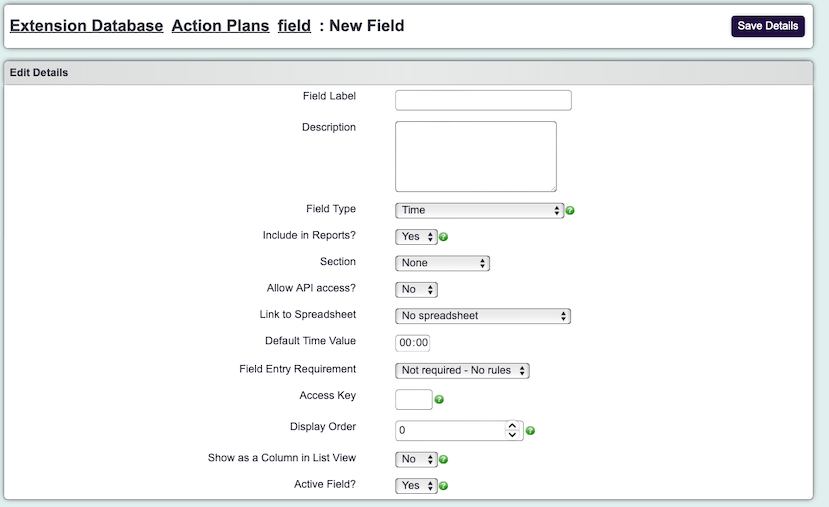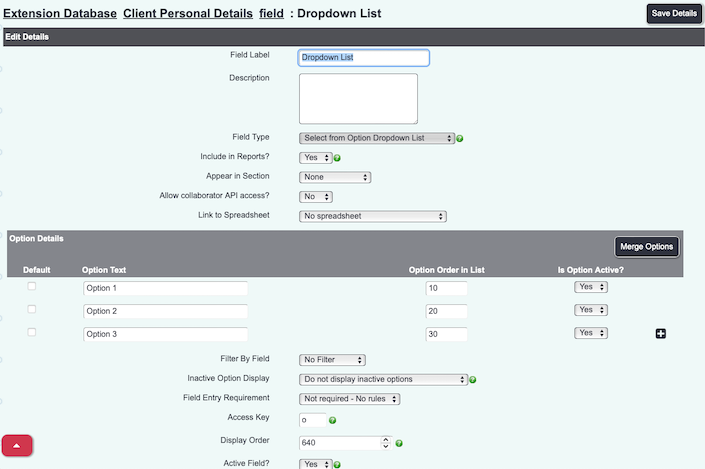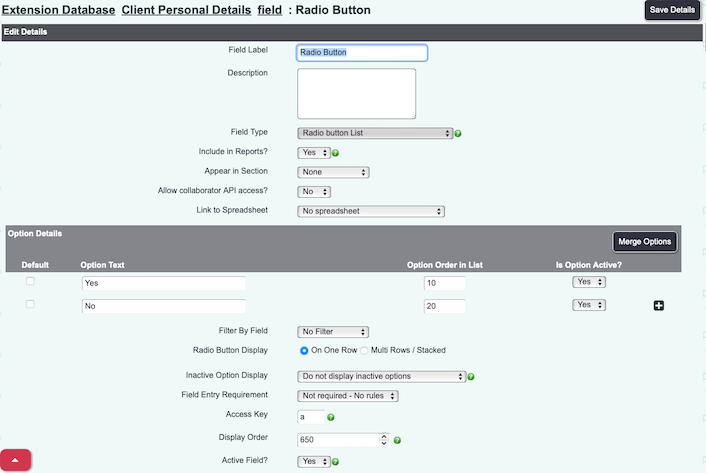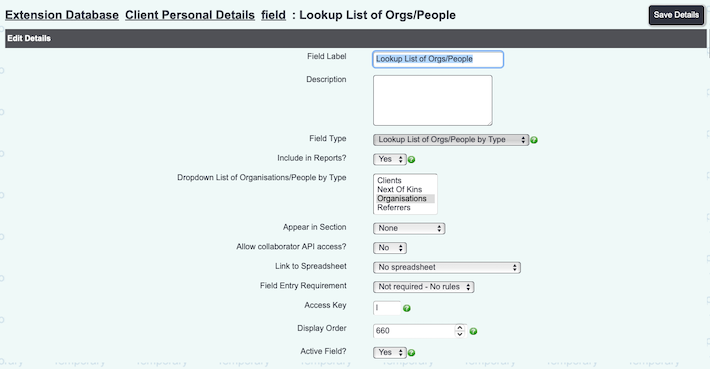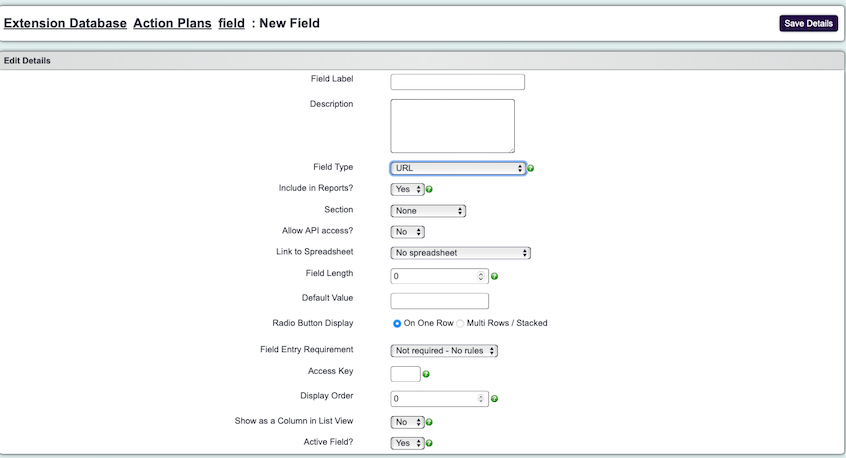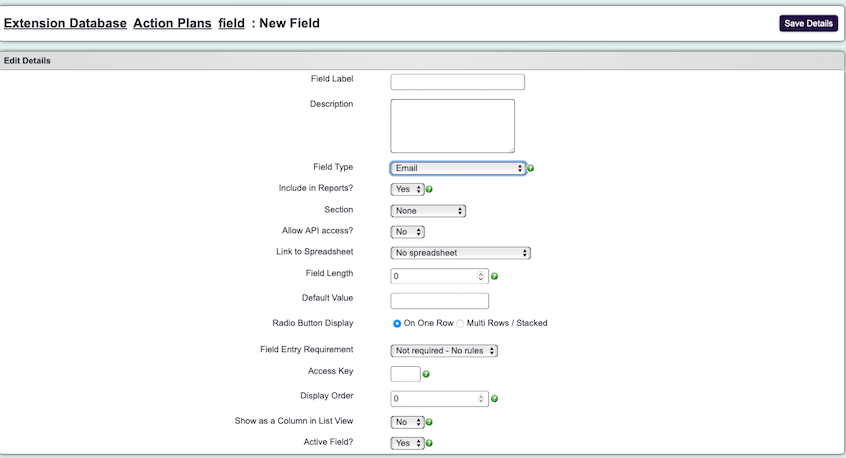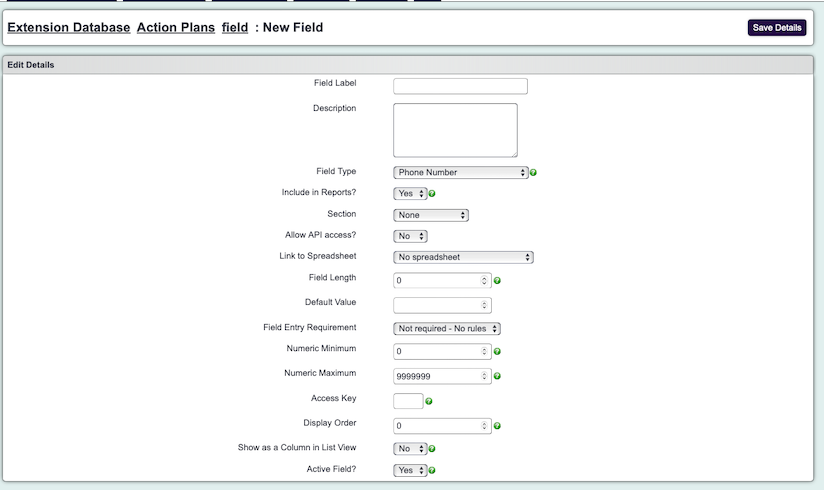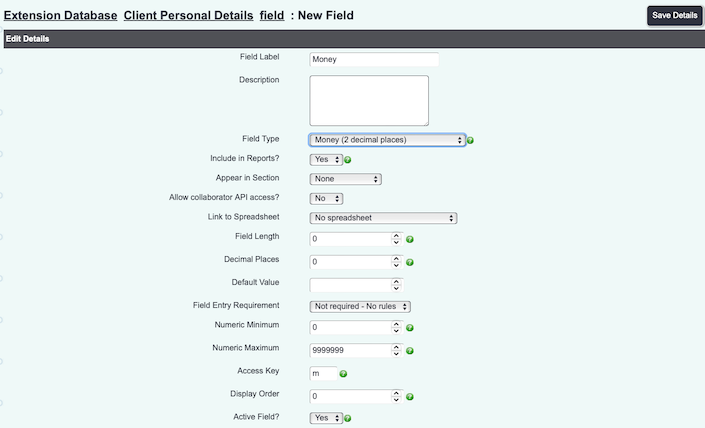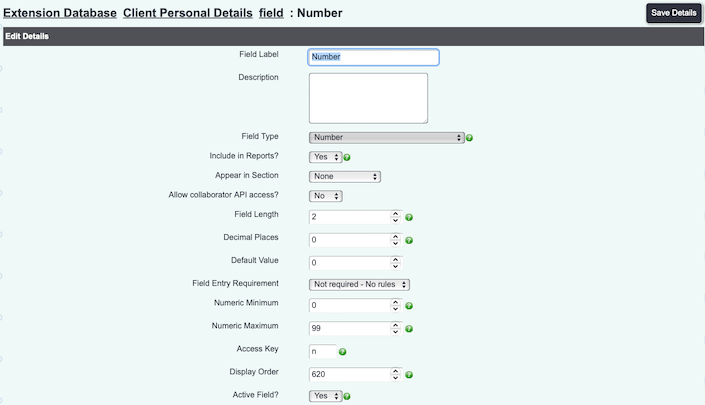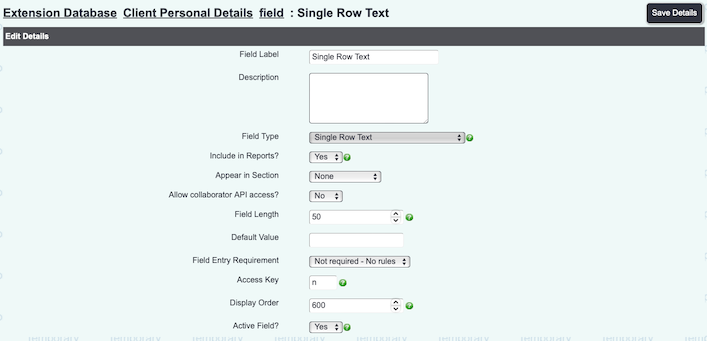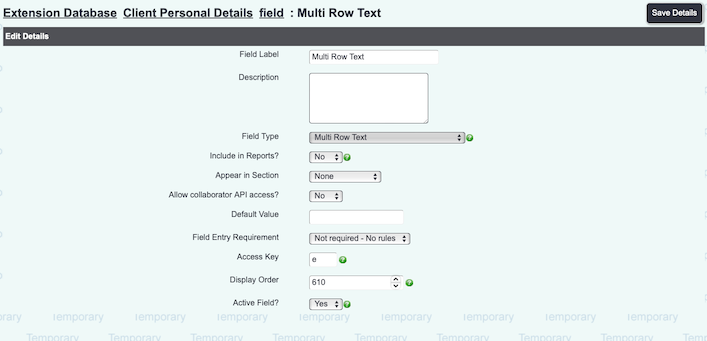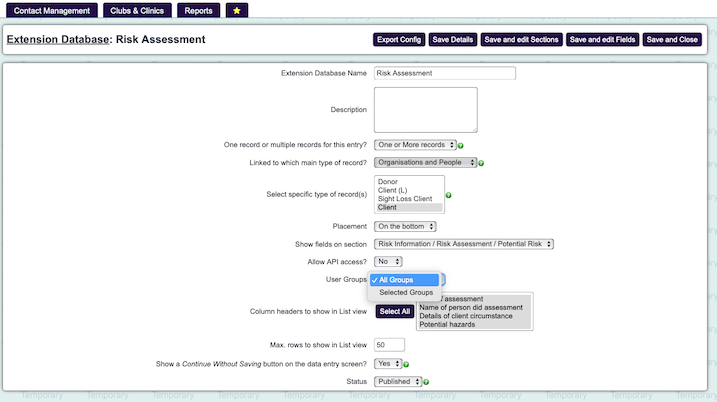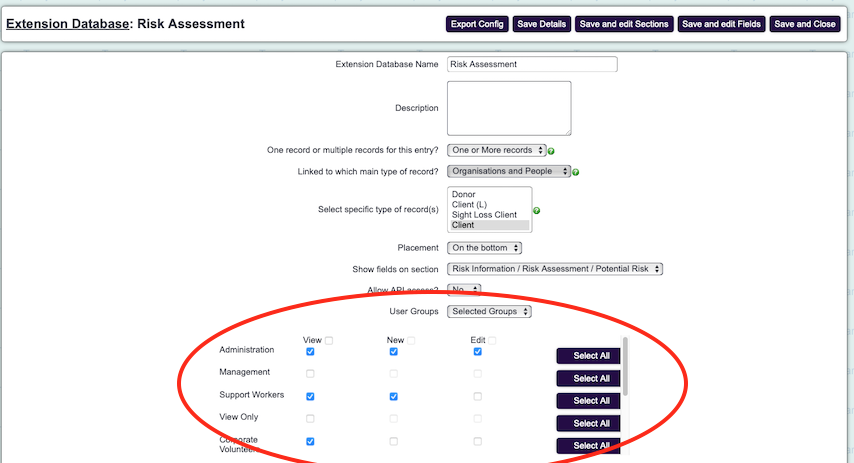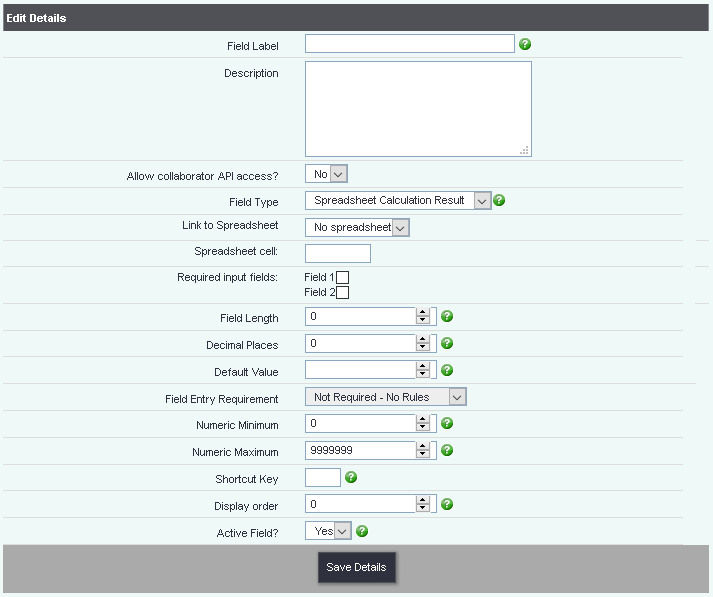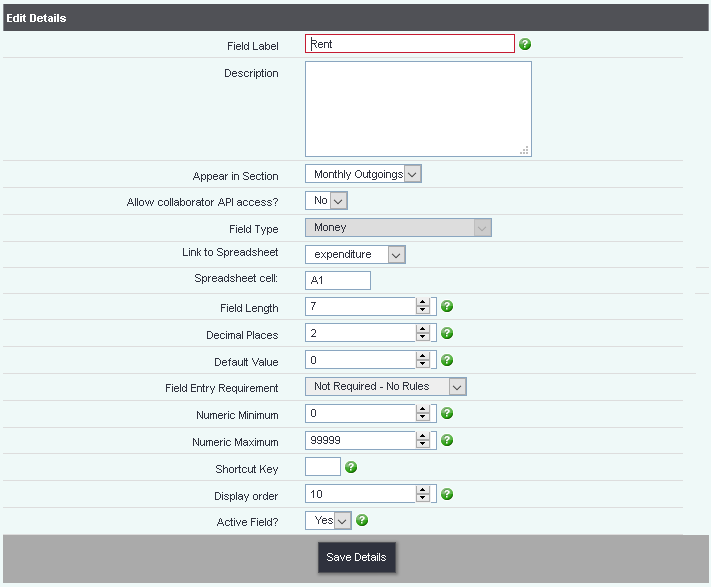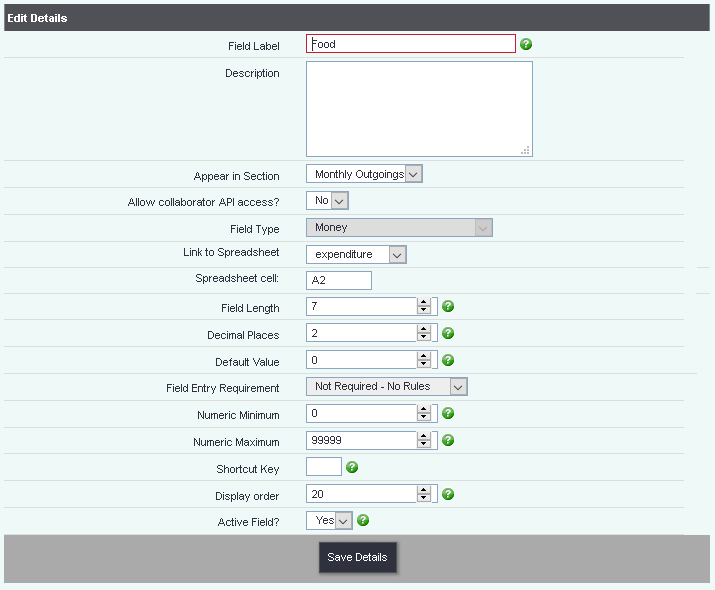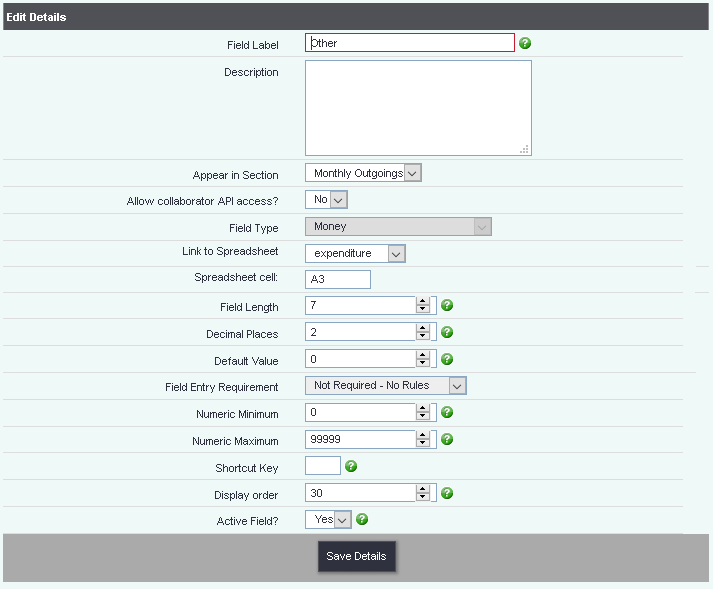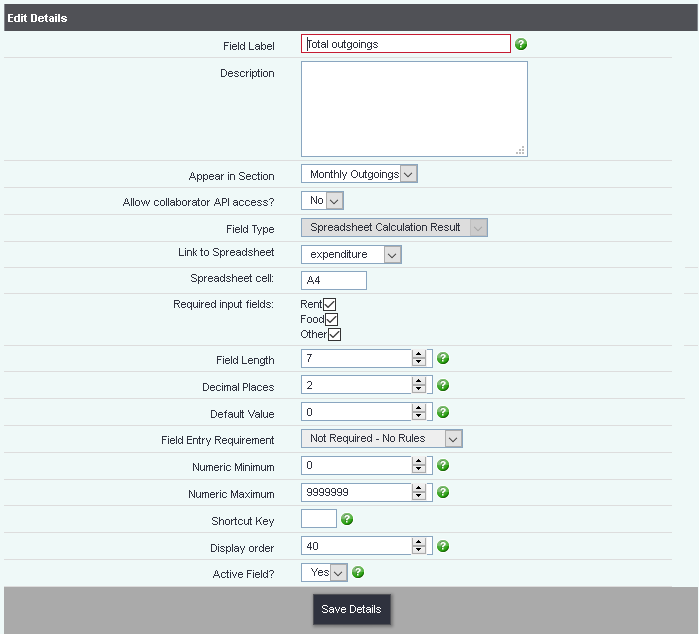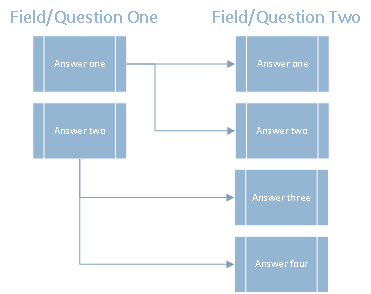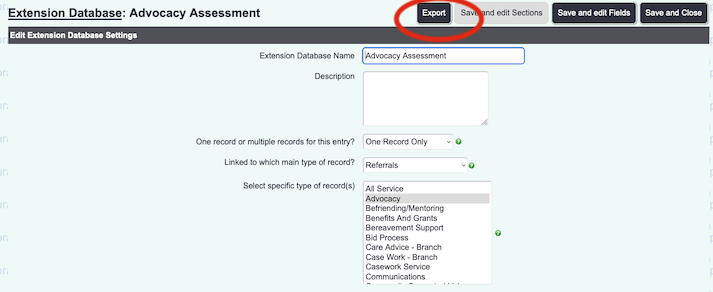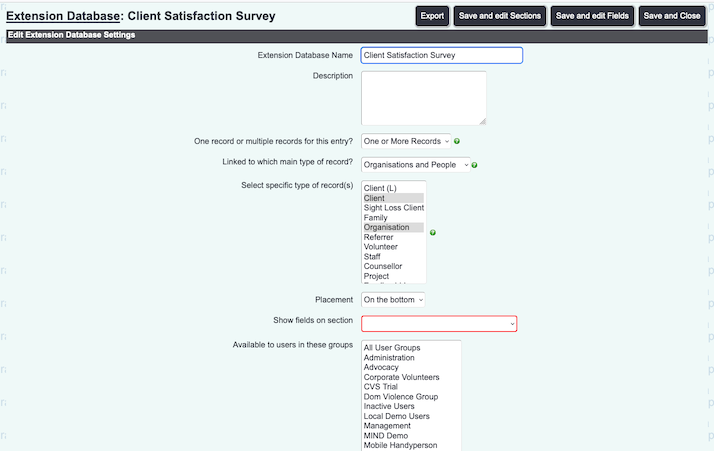Extension Database Setup
Contents
- 1 Introduction to Extension Databases
- 2 Extension Database Settings
- 3 Extension Database Sections
- 4 Extension Database Fields
- 5 Extension Database Permissions
- 6 Extension Database for Outcomes
- 7 Extension Databases for Record Types
- 8 Inviting Others to complete Extension Databases
- 9 Spreadsheet Calculations Result
- 10 Filter Fields
- 11 Export/Import
Introduction to Extension Databases
Extension Databases provide a way for you to add fields, or sets of fields, to the system. They can be used to capture any information which is not catered for in the standard setup.
The Extension Database Setup page lists the Extension Databases that are already set up on your system (if there are any). You can amend existing Extension Databases and create new ones.
To create a new Extension Database click "New Extension Database" or click on the name of an existing Extension Database to edit it. Its important you understand the different locations available for an Extension Database. The below webinar explains this.
Extension Database Settings
On an existing Extension Database or when saving the Extension Database settings for a new one a navigation bar will appear at the top of the section:
This allows you to move between the following sections of the setup:
- The name of the Extension Database is underlined - This is the general details of where the extension data base will appear and which security groups can access it.
- All Sections - Sections are used to group questions together to make data entry easier and more logical.
- New Field - allows you to add new fields
To create a new Extension Database, click on New Extension Database
- Extension Database Name- This is name of the Extension Database and will also be the button label that appears for the user.
- Description - This is information about the Extension Database which can only be viewed on this page
- One record or multiple records for this entry?
- One Record - This displays a single set of fields, if the data is changed the previous entry will be simply over written. This would be used for questions like 'Do you drive?', if circumstances changed you would simply change the answer to the question.
- One or More Records - This is used if multiple sets of data is required. As an example you could have an extension database to record donations given, as you may get more than one donation from the some person.
- Linked to which main type of record?:
- Organisations and People - This will be able to be displayed on a record tab or at the footer of the record.
- Referrals - This allows the Extension Database to be displayed on the history tab, referral edit screen or appear when recording a contact. See Project Setup for further details.
- Clubs and Clinics - This will appear on the footer of a Club, Clinic or Group details page, for those specified.
- Clubs and Clinics Meetings - This will appear on the individual occurrence of the Club, Clinic or Group on the incomplete/complete meeting tabs and when a meeting is completed via the wizard or complete button.
- Show Fields on Section - This option appears when the linked to option is set to 'Organisations and People'Specify weather the Extension Database is to be displayed on the required section Additional sections can be setup, see Customise Orgs & People for details.
- Available to users in these groups - Select which Groups of users can access the Extension Database.
- Maximum number of column Headers to be viewable when selecting from multiple records? - When selecting 'One or More' you can specify the number of columns displayed for the Extension Database.
- Active? - When set to 'Yes' the Extension Database will be dis[played and can be reported on.
Once the above options have been completed you can then select one of the following save buttons:
- Save and edit Sections - Saves any changes and moves to the page to create sections, if required.
- Save and edit Fields - Saves any changes and moves to the page to create the fields to record the data.
Extension Database Sections
Section Headings will be displayed if you add an Extension Database to display One or More. They won't appear if you have just added fields to an existing section such as the Personal Details page. The following webinar gives an example of how section headings can be used for things like assessments.
Sections allow you to break up fields into logical sections. Example:
Section 1: Assessment one Date: Range of questions Section 2: Assessment two Date: Range of questions
To create a new section click on the lick 'Create a new Extension Database Section...'. Type the required label for the section and click go to create it.
The section will be created and added to the list of existing sections (if any).
To edit an existing section click on the sections name. From here you can specify if the heading;
- Displays as a title, the name.
- Displays as just a dividing line.
- Displays as a blank line.
To delete a section click the Bin Icon .
Reordering Sections
Click on the 'Enable Reorder' button to Enable reordering, from here you can drag and drop the sections to the required position, or use the A-Z or Z-A option. Once complete you can then click 'Disable Reorder'.
Extension Database Fields
An Extension Data base can contain a series of different field types. After you have completed the field options click 'Save Details' to create the field. As you click New Field, you will notice the field type is divided into categories as seen below.
The following webinar explains the different types of fields available.
Date and Time
Here you can add both date fields and Time fields
Date
Allows entry of a date, useful when reporting on certain periods.
- Field Label - This is the name/question that is displayed to the user.
- Description - This is displayed as help text via a question mark icon
. This is note displayed when the fields are displayed on a tab.
- Field Type - Option to select which of these field types you wish to use. Once a field has been created the field type cannot be changed. Set to 'Date'.
- Include in Reports - allows you to report on data entered
- Section - If you are using sections you can specify which section this option appears in.
- Allow API access? - Used for API connections if your system links to a third party system. When set to yes you can then specify the API name to be used.
- Link to Spreadsheet - If the extension database is using excel to produce calculations and the field is as part of the calculations, specify the spreadsheet template that field is used to input in to. See Spreadsheet Calculations Result for further details.
- Spreadsheet cell - Specify the cell in the spreadsheet that the field feeds into.
- Default Date Value - You can populate the field with the date the record is entered or left empty.
- Field Entry Requirement
- Not Required - No Rules - The field will be displayed but can be left blank.
- Warning - Warn if not filled in - The field will be displayed with a yellow background (not when set as radio buttons) and a pop up will be displayed if left blank when saving.
- Access Key - Specify a shortcut key so the user can jump directly to this field when entering data. Please note that different operating systems and browser also use shortcut keys, this will override this option.
- Display Order - The order that this field will be displayed on the page or section.
- Active - When set to 'Yes' this field will be displayed to the user.
Time
Allows entry of a time.
- Field Label - This is the name/question that is displayed to the user.
- Description - This is displayed as help text via a question mark icon
. This is note displayed when the fields are displayed on a tab.
- Field Type - Option to select which of these field types you wish to use. Once a field has been created the field type cannot be changed. Set to 'Date'.
- Include in Reports - allows you to report on data entered
- Section - If you are using sections you can specify which section this option appears in.
- Allow API access? - Used for API connections if your system links to a third party system. When set to yes you can then specify the API name to be used.
- Link to Spreadsheet - If the extension database is using excel to produce calculations and the field is as part of the calculations, specify the spreadsheet template that field is used to input in to. See Spreadsheet Calculations Result for further details.
- Default Time Value - allows you to specify a default value which will displayed when the extension database is created.
- Field Entry Requirement
- Not Required - No Rules - The field will be displayed but can be left blank.
- Access Key - Specify a shortcut key so the user can jump directly to this field when entering data. Please note that different operating systems and browser also use shortcut keys, this will override this option.
- Display Order - The order that this field will be displayed on the page or section.
- Active - When set to 'Yes' this field will be displayed to the user.
Lists
Drop-Down
This will display a dropdown list that the user can select one option from.
- Field Label - This is the name/question that is displayed to the user.
- Description - This is displayed as help text via a question mark icon
. This is note displayed when the fields are displayed on a tab.
- Field Type - Option to select which of these field types you wish to use. Once a field has been created the field type cannot be changed. Set to 'Drop down'.
- Include in Reports - allows you to report on data entered
- Section - If you are using sections you can specify which section this option appears in.
- Allow API access? - Used for API connections if your system links to a third party system. When set to yes you can then specify the API name to be used.
- Link to Spreadsheet - If the extension database is using excel to produce calculations and the field is as part of the calculations, specify the spreadsheet template that field is used to input in to. See Spreadsheet Calculations Result for further details.
- Spreadsheet cell - Specify the cell in the spreadsheet that the field feeds into.
- Option Details - This is the items that will appear in the drop down list.
- Default - When ticked this option will automatically be selected when entering a new record. It is worth considering if you want this value saved if the extension database is not manually changed before saving a client record.
- Option Text - This is the name displayed in the dropdown list.
- Filter By Field - This allows the dropdown list to be filtered by another drop down list (does not work with radio buttons). The options that have been selected on a previous question can filter what options can be selected on this question. From the list select the dropdown list that is to be used to filter this question.
- Inactive Option Display
- Do not display inactive options - Options that have been set as inactive will not be displayed in the dropdown list.
- Display inactive options as not selectable - This will display inactive options, which cannot be selected by the user.
- Field Entry Requirement
- Not Required - No Rules - The field will be displayed but can be left blank.
- Warning - Warn if not filled in - The field will be displayed with a yellow background (not when set as radio buttons) and a pop up will be displayed if left blank when saving.
- Access Key - Specify a shortcut key so the user can jump directly to this field when entering data. Please note that different operating systems and browser also use shortcut keys, this will override this option.
- Display Order - The order that this field will be displayed on the page or section.
- Active - When set to 'Yes' this field will be displayed to the user.
Radio Button
As "Drop down lists", but options will be displayed as clickable buttons. Only one button can be selected at a time.
- You can choose whether the buttons display "On one row" (side by side), or "Multi Rows/Stacked" (one above the other).
- Field Label - This is the name/question that is displayed to the user.
- Description - This is displayed as help text via a question mark icon
. This is note displayed when the fields are displayed on a tab.
- Field Type - Option to select which of these field types you wish to use. Once a field has been created the field type cannot be changed. Set to 'Radio Button'.
- Include in Reports - allows you to report on data entered
- Section - If you are using sections you can specify which section this option appears in.
- Allow API access? - Used for API connections if your system links to a third party system. When set to yes you can then specify the API name to be used.
- Link to Spreadsheet - If the extension database is using excel to produce calculations and the field is as part of the calculations, specify the spreadsheet template that field is used to input in to. See Spreadsheet Calculations Result for further details.
- Spreadsheet cell - Specify the cell in the spreadsheet that the field feeds into.
- Option Text - This is the name displayed in the dropdown list.
- Option Details - This is the items that will appear in the drop down list.
- Default - When ticked this option will automatically be selected when entering a new record.
- Display Order - The order the option will be displayed in the dropdown list.
- Selection list for the filter - Select which answers of the previously selected question that the current option is available to be selected. If you are using the filter and nothing is selected then the option cannot be selected. If the option is to be available to all then all answers to the previous question must be selected.
- Active - If set to yes then this option can be selected from the drop down list.
- Plus Icon
- Creates a new line for the next option.
- Radio Button Display - Select the required display option.
- Filter By Field - This allows the dropdown list to be filtered by another radio button field (does not work with dropdown lists). The options that have been selected on a previous question can filter what options can be selected on this question. From the list select the radio button field that is to be used to filter this question.
- On one row - Ideal for less options and is displayed across the screen.
- Multi rows/Stacked - Ideal for options with a long names or larger quantity of options.
- Inactive Option Display
- Do not display inactive options - Options that have been set as inactive will not be displayed in the dropdown list.
- Display inactive options as not selectable - This will display inactive options, which cannot be selected by the user.
- Field Entry Requirement
- Not Required - No Rules - The field will be displayed but can be left blank.
- Warning - Warn if not filled in - The field will be displayed with a yellow background (not when set as radio buttons) and a pop up will be displayed if left blank when saving.
- Shortcut Key - Specify a shortcut key so the user can jump directly to this field when entering data. Please note that different operating systems and browser also use shortcut keys, this will override this option.
- Display Order - The order that this field will be displayed on the page or section.
- Active - When set to 'Yes' this field will be displayed to the user.
Organisations or People List
This field displays a look up list of Organisations and People on the system.
- Field Label - This is the name/question that is displayed to the user.
- Description - This is displayed as help text via a question mark icon
. This is note displayed when the fields are displayed on a tab.
- Field Type - Option to select which of these field types you wish to use. Once a field has been created the field type cannot be changed. Set to 'Organisations and People List'.
- Include in Reports - allows you to report on data entered
- Types - Selected the required record types that will be available to be selected. Note you can select more than one.
- Section - If you are using sections you can specify which section this option appears in.
- Allow API access? - Used for API connections if your system links to a third party system. When set to yes you can then specify the API name to be used.
- Field Entry Requirement
- Not Required - No Rules - The field will be displayed but can be left blank.
- Warning - Warn if not filled in - The field will be displayed with a yellow background (not when set as radio buttons) and a pop up will be displayed if left blank when saving.
- Access Key - Specify a shortcut key so the user can jump directly to this field when entering data. Please note that different operating systems and browser also use shortcut keys, this will override this option.
- Display Order - The order that this field will be displayed on the page or section.
- Active - When set to 'Yes' this field will be displayed to the user.
Text and Numbers
URL
This will allow you to either, add a URL which is required as part of the extension database entry.
- Field Label - This is the name/question that is displayed to the user.
- Description - This is displayed as help text via a question mark icon
. This is note displayed when the fields are displayed on a tab.
- Field Type - Option to select which of these field types you wish to use. Once a field has been created the field type cannot be changed. Set to 'URL'.
- Include in Reports - allows you to choose if this data will appear in reports.
- Section - If you are using sections you can specify which section this option appears in.
- Allow API access? - Used for API connections if your system links to a third party system. When set to yes you can then specify the API name to be used.
- Link to Spreadsheet - If the extension database is using excel to produce calculations and the field is as part of the calculations, specify the spreadsheet template that field is used to input in to. See Spreadsheet Calculations Result for further details.
- Spreadsheet cell - Specify the cell in the spreadsheet that the field feeds into.
- Field length - This determines maximum number of characters allowed.
- Default Value - Specify a default value that will be prepopulated.
- Field Entry Requirement
- Not Required - No Rules - The field will be displayed but can be left blank.
- Warning - Warn if not filled in - The field will be displayed with a yellow background (not when set as radio buttons) and a pop up will be displayed if left blank when saving.
- Access Key - Specify a shortcut key so the user can jump directly to this field when entering data. Please note that different operating systems and browser also use shortcut keys, this will override this option.
- Display Order - The order that this field will be displayed on the page or section.
- Active - When set to 'Yes' this field will be displayed to the user.
Allows you to add an email address to the extension database.
- Field Label - This is the name/question that is displayed to the user.
- Description - This is displayed as help text via a question mark icon
. This is note displayed when the fields are displayed on a tab.
- Field Type - Option to select which of these field types you wish to use. Once a field has been created the field type cannot be changed. Set to 'Email'.
- Include in Reports - allows you to choose if this data will appear in reports.
- Section - If you are using sections you can specify which section this option appears in.
- Allow API access? - Used for API connections if your system links to a third party system. When set to yes you can then specify the API name to be used.
- Link to Spreadsheet - If the extension database is using excel to produce calculations and the field is as part of the calculations, specify the spreadsheet template that field is used to input in to. See Spreadsheet Calculations Result for further details.
- Spreadsheet cell - Specify the cell in the spreadsheet that the field feeds into.
- Default Value - Specify a default value that will be prepopulated.
- Field Entry Requirement
- Not Required - No Rules - The field will be displayed but can be left blank.
- Warning - Warn if not filled in - The field will be displayed with a yellow background (not when set as radio buttons) and a pop up will be displayed if left blank when saving.
- Access Key - Specify a shortcut key so the user can jump directly to this field when entering data. Please note that different operating systems and browser also use shortcut keys, this will override this option.
- Display Order - The order that this field will be displayed on the page or section.
- Active - When set to 'Yes' this field will be displayed to the user.
Phone Number
Allows you to add a phone number to the extension database entry.
- Field Label - This is the name/question that is displayed to the user.
- Description - This is displayed as help text via a question mark icon
. This is note displayed when the fields are displayed on a tab.
- Field Type - Option to select which of these field types you wish to use. Once a field has been created the field type cannot be changed. Set to 'Phone Number'.
- Include in Reports - allows you to choose if this data will appear in reports.
- Section - If you are using sections you can specify which section this option appears in.
- Allow API access? - Used for API connections if your system links to a third party system. When set to yes you can then specify the API name to be used.
- Link to Spreadsheet - If the extension database is using excel to produce calculations and the field is as part of the calculations, specify the spreadsheet template that field is used to input in to. See Spreadsheet Calculations Result for further details.
- Spreadsheet cell - Specify the cell in the spreadsheet that the field feeds into.
- Field Lenght - specify the length of characters that will be allowed in this field
- Default Value - Specify a default value that will be prepopulated.
- Field Entry Requirement
- Not Required - No Rules - The field will be displayed but can be left blank.
- Warning - Warn if not filled in - The field will be displayed with a yellow background (not when set as radio buttons) and a pop up will be displayed if left blank when saving.
- Access Key - Specify a shortcut key so the user can jump directly to this field when entering data. Please note that different operating systems and browser also use shortcut keys, this will override this option.
- Display Order - The order that this field will be displayed on the page or section.
- Active - When set to 'Yes' this field will be displayed to the user.
Money
Allows only numbers to be used and totals on displayed reports.
- Field Label - This is the name/question that is displayed to the user.
- Description - This is displayed as help text via a question mark icon
. This is note displayed when the fields are displayed on a tab.
- Field Type - Option to select which of these field types you wish to use. Once a field has been created the field type cannot be changed. Set to 'Money'.
- Include in Reports - allows you to decide if you would like to include this data in reports.
- Section - If you are using sections you can specify which section this option appears in.
- API access? - Used for API connections if your system links to a third party system. When set to yes you can then specify the API name to be used.
- Link to Spreadsheet - If the extension database is using excel to produce calculations and the field is as part of the calculations, specify the spreadsheet template that field is used to input in to. See Spreadsheet Calculations Result for further details.
- Spreadsheet cell - Specify the cell in the spreadsheet that the field feeds into.
- Field length - This determines maximum number of digits (including decimal point), this works alongside the numeric maximum.
- Decimal Places - Specify the number of decimal places that are required, please keep in mind the field length.
- Default Value - Specify a default value that will be prepopulated.
- Field Entry Requirement
- Not Required - No Rules - The field will be displayed but can be left blank.
- Warning - Warn if not filled in - The field will be displayed with a yellow background (not when set as radio buttons) and a pop up will be displayed if left blank when saving.
- Numeric Minimum - The minimum value a user can enter.
- Numeric Maximum - The maximum value a user can enter, this must comply with the field length.
- Access Key - Specify a shortcut key so the user can jump directly to this field when entering data. Please note that different operating systems and browser also use shortcut keys, this will override this option.
- Display Order - The order that this field will be displayed on the page or section.
- Active - When set to 'Yes' this field will be displayed to the user.
Number
Allows only numbers to be used and totals on displayed reports.
- Field Label - This is the name/question that is displayed to the user.
- Description - This is displayed as help text via a question mark icon
. This is note displayed when the fields are displayed on a tab.
- Field Type - Option to select which of these field types you wish to use. Once a field has been created the field type cannot be changed. Set to 'Number'.
- Include in Reports - allows you to choose if this data will appear in reports.
- Section - If you are using sections you can specify which section this option appears in.
- Allow API access? - Used for API connections if your system links to a third party system. When set to yes you can then specify the API name to be used.
- Link to Spreadsheet - If the extension database is using excel to produce calculations and the field is as part of the calculations, specify the spreadsheet template that field is used to input in to. See Spreadsheet Calculations Result for further details.
- Spreadsheet cell - Specify the cell in the spreadsheet that the field feeds into.
- Field length - This determines maximum number of digits (including decimal point), this works alongside the numeric maximum.
- Decimal Places - Specify the number of decimal places that are required, please keep in mind the field length.
- Default Value - Specify a default value that will be prepopulated.
- Field Entry Requirement
- Not Required - No Rules - The field will be displayed but can be left blank.
- Warning - Warn if not filled in - The field will be displayed with a yellow background (not when set as radio buttons) and a pop up will be displayed if left blank when saving.
- Numeric Minimum - The minimum value a user can enter.
- Numeric Maximum - The maximum value a user can enter, this must comply with the field length.
- Access Key - Specify a shortcut key so the user can jump directly to this field when entering data. Please note that different operating systems and browser also use shortcut keys, this will override this option.
- Display Order - The order that this field will be displayed on the page or section.
- Active - When set to 'Yes' this field will be displayed to the user.
Text (Single-Row)
This will display a single line text box based on the field length.
- Field Label - This is the name/question that is displayed to the user.
- Description - This is displayed as help text via a question mark icon
. This is note displayed when the fields are displayed on a tab.
- Field Type - Option to select which of these field types you wish to use. Once a field has been created the field type cannot be changed. Set to 'Text (single-row)'.
- Appear in Reports - allows you to specify if data entered will appear in your reports. Useful if you want to add a free text box, but don't need that data for reporting purposes.
- Section - If you are using sections you can specify which section this option appears in.
- Allow API access? - Used for API connections if your system links to a third party system. When set to yes you can then specify the API name to be used.
- Link to Spreadsheet - If the extension database is using excel to produce calculations and the field is as part of the calculations, specify the spreadsheet template that field is used to input in to. See Spreadsheet Calculations Result for further details.
- Spreadsheet cell - Specify the cell in the spreadsheet that the field feeds into.
- Field length - This determines the length of the field and the maximum number of characters that can be entered.
- Default Value - You can populate the field with the details specified.
- Field Entry Requirement
- Not Required - No Rules - The field will be displayed but can be left blank.
- Warning - Warn if not filled in - The field will be displayed with a yellow background (not when set as radio buttons) and a pop up will be displayed if left blank when saving.
- Access Key - Specify a shortcut key so the user can jump directly to this field when entering data. Please note that different operating systems and browser also use shortcut keys, this will override this option.
- Display Order - The order that this field will be displayed on the page or section.
- Active - When set to 'Yes' this field will be displayed to the user.
Text (Multi-row)
Displays a text box.
- Field Label - This is the name/question that is displayed to the user.
- Description - This is displayed as help text via a question mark icon
. This is note displayed when the fields are displayed on a tab.
- Field Type - Option to select which of these field types you wish to use. Once a field has been created the field type cannot be changed. Set to 'Text (multi-row)'.
- Include in Reports - you can decide to include this data in reports.
- Section - If you are using sections you can specify which section this option appears in.
- Allow API access? - Used for API connections if your system links to a third party system. When set to yes you can then specify the API name to be used.
- Link to Spreadsheet - If the extension database is using excel to produce calculations and the field is as part of the calculations, specify the spreadsheet template that field is used to input in to. See Spreadsheet Calculations Result for further details.
- Spreadsheet cell - Specify the cell in the spreadsheet that the field feeds into.
- Default Value - can be used if you want a value to be automatically entered into this field. Use with caution as people may have to delete any text before entering their own.
- Field Entry Requirement
- Not Required - No Rules - The field will be displayed but can be left blank.
- Warning - Warn if not filled in - The field will be displayed with a yellow background (not when set as radio buttons) and a pop up will be displayed if left blank when saving.
- Access Key - Specify a shortcut key so the user can jump directly to this field when entering data. Please note that different operating systems and browser also use shortcut keys, this will override this option.
- Display Order - The order that this field will be displayed on the page or section.
- Active - When set to 'Yes' this field will be displayed to the user.
Extension Database Permissions
When you create an extension database you can assign permissions to your user groups. This will allow them to read only, create a new one or edit an existing record. The entire extension database can be hidden from their view if you wish. When you set up the extension database, if you wish to alter group-based permissions, click on User Groups as seen below and change from All Groups, to Selected Groups.
You will then see a list of all your user groups so you can place a tick in each column:
- Vew - means they can see the extension database
- New - they can create new versions (only applies to Multi-record extension databases)
- Edit - they can edit an existing record
You can also use the Select all option on each row.
Extension Database for Outcomes
Extension databases are widely used for things like outcomes or impact measurement tools. They are custom to your requirements, easy to input and provide useful data for reporting on outcomes/impact. The following webinar explains how they can be set up.
Extension Databases for Record Types
You can add custom fields to any of your record types such as Client, Staff, Volunteer etc. These are great to extend the reporting information or to simply add additional useful information to that record. The following webinar illustrates how this can be set up.
Inviting Others to complete Extension Databases
Once you have created an extension database, you can create an invitation link which can be sent to people outside of your organisation. Typically, this can be the client themselves but it has many uses. You might create an assessment extension database which needs to be sent to a professional who is working with that particular client. The professional clicks on the link you generate, fills in the required fields and it will be updated on the client record. You can also use this for client feedback, for surveys, outcomes etc. Any data entered will be available in Extension database reports with all the other records.
Please note, this feature is currently only available for Organisation/People Extension Databases.
Enabling Access
Firstly, this option is controlled in Group Access as you may not want all users to be able to create links. Once in Group Access, select the group you wish to be able to create links, go to the Miscellaneous section and look for "Extension Database Invitations". You can choose View, Create or Edit.
Allow Links
You then need to allow links to be generated for that particular extension database. In the main settings screen for that particular extension database you need to set Allow invitations to fill in this Extension Database? to Yes. The below example of a stakeholder engagement survey which is sent to professionals/contract managers etc. You will see the option to enable links circled in red.
Invite someone to create a new record
Go to the person/organisation record you wish the record to be sent from. Click on Invite Someone to Create a New Record.
You will then be asked to create a date range. This will be the time period you want the link to be active for. It is recommended to add an Expiry Date.
Once you have set the time period, you can then copy the link and then either paste into an email, or other system. This is the link the other person will use to complete the extension database.
Here is the final version of what the recipient will see.
Invite someone to edit a record
It could be the case where you have completed parts of an extension database and you would require someone externally to complete the rest. You can generate a link to a partially complete/existing record. Bear in mind, they will be able to see all the fields so you must consider what kind of information is contained in the extension database.
Go to the existing extension database record and then click on Invite someone to Edit this record. It will then follow the same steps as listed above.
View Invitations
To view the existing invitations and also to track engagement click on View Invitations. Here you will see a list of all the links that have been generated. You will also see the number of times it has been viewed and also the number of times it has been saved. The expiry date is also listed and can be edited from this screen.
Disable Access to Invitations
To disable access to an invitation, click on View Invitations, click on the Invitation and set the expiry date as a date/time earlier than now. This disables the link.
Anyone clicking on the link after that date/time will get a message saying "This invitation was not found or has expired."
Spreadsheet Calculations Result
The Spreadsheet Calculations Result field uses the fields linked to a spreadsheet template and adds a button for the user to calculate results based on the data entered. The template needs to be upload via System Uploads and set to be used with extension databases. When the user clicks the calculate button when entering data the system reads the formulas in the corresponding spreadsheet to return the result. This allows administrators to add templates containing a wide range of formulas, including standard additions, subtractions, multiplications, IF Formulas, VLOOKUP formulas and more. It is not possible to use conditional formatting, tables (including pivot) and array based formulas that require curly brackets {}. The results that are produced from the calculations will be save when the record is saved.
Complete the following details:
- Field Label - This is the name/question that is displayed to the user.
- Description - This is displayed as help text via a question mark icon
. This is note displayed when the fields are displayed on a tab.
- Appear in Section - If you are using sections you can specify which section this option appears in.
- Allow collaborator API access? - Used for API connections if your system links to a third party system. When set to yes you can then specify the API name to be used.
- Field Type - Option to select which of these field types you wish to use. Once a field has been created the field type cannot be changed. Set to 'Numeric Only'.
- Link to Spreadsheet - If the extension database is using excel to produce calculations and the field is as part of the calculation, specify the spreadsheet template that field is used to input in to. See .
- Spreadsheet cell - Specify the cell in the spreadsheet that contains the formula for the calculation.
- Required input fields - Select the fields that are used with this calculation (these are determined by the formula in the spreadsheet).
- Field length - This determines maximum number of digits (including decimal point), this works alongside the numeric maximum.
- Decimal Places - Specify the number of decimal places that are required, please keep in mind the field length.
- Default Value - Specify a default value that will be prepopulated.
- Field Entry Requirement
- Not Required - No Rules - The field will be displayed but can be left blank.
- Warning - Warn if not filled in - The field will be displayed with a yellow background (not when set as radio buttons) and a pop up will be displayed if left blank when saving.
- Numeric Minimum - The minimum value a user can enter.
- Numeric Maximum - The maximum value a user can enter, this must comply with the field length.
- Shortcut Key - Specify a shortcut key so the user can jump directly to this field when entering data. Please note that different operating systems and browser also use shortcut keys, this will override this option.
- Display Order - The order that this field will be displayed on the page or section.
- Active - When set to 'Yes' this field will be displayed to the user.
Example
In this example we are going to use a basic calculation by adding up some input fields to calculate a persons expenditure. There are three fields, Rent, Food and Bills, and the calculator will add these up. I an spreadsheet A1, A2 &a3 would be left blank and A4 will have the formula =A1+A2+A3 or =SUM(A1:A3). The spreadsheet is the uploaded called expenditure. The fields are then set up as follows;
Field 1
Field 2
Field 4
Field 4
User input field
The user will be displayed the screen below, on clicking 'Calculate' the result will be display and saved when the save button is pressed.
Filter Fields
For dropdown lists and radio button you can filter the options displayed from fields, depending what was selected in a previous field. The diagram below shows two question. If on question one the answer one is selected the for question two answers one and two will be available for selection. If answer two was selected on question one then answers three and for will be selectable on question two.
Export/Import
You can also import an existing Extension Database into your system, saving you from creating it from scratch. This could be because you are working as part of a consortium and you all have to use the same outcome/assessment tool, or it could be because you have already set it up on your training/test site. Setting an extension database up on your Replica Database is a great way to test if it functions correctly. You can do a trial run with some entries and ensure it reports correctly. Once its set up you can simply export the extension database from your replica site and import it into your live site.
The following video explains how this can be done.
To start, click on the extension database you wish to export.
You will then see a preview and you can Export.
Once exported, you can save the Excel file in a safe location for import later. To import, log into the system you wish to import the extension database to. Ensuring they are both on the same version. Click on the Import button at the top of the Extension Database Menu.
You can then browse for the file, and select it for import.
You can now preview the fields which will be imported but you can go ahead and click on Import and it will be ready to use.
Once imported, you may find you need to amend relevant settings for Group Access along with which section you wish the extension database to appear.

